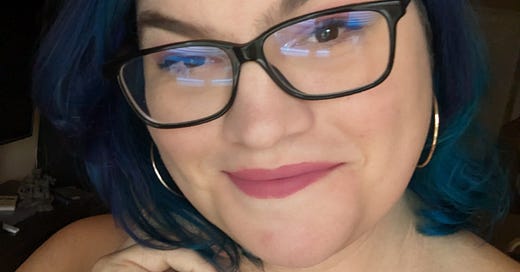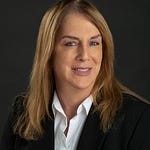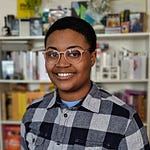TNG Worklife is a podcast and ongoing conversation about the work-life experiences of the transgender, nonbinary, and gender expansive communities.
You can find us on Apple, Spotify, and Instagram.
This podcast is always free, and if you enjoyed it, you can support the work by subscribing for as little as $8 a month.
About Lyersia Kursave
LinkedIn: https://www.linkedin.com/in/lyseria-kursave-894646298/
Instagram: https://www.instagram.com/flareformagic/
Credits
Opening music - Abstract Fashion Pop by QubeSounds
Closing music - Where the Light Is by lemonmusicstudio
Episode Transcript
[upbeat pop music plays]
[Kai Stowers]
Hello and welcome to season two of TNG Worklife, a podcast about the experiences of the trans nonbinary and gender expansive communities in the workplace. This season we're focusing on the strength we gain through community and partnership. You can join our community by signing up at TNGworklife.substack.com, which will deliver each episode, including the full transcript, right to your inbox. Today, I'm speaking with Lyseria Kursave, an electrician and president of Pride at Work, about working as a trans woman and advocating for LGBTQ people in the building trades. She shares examples of partnership and allyship that really make a difference for our community.
I left our conversation reflecting on practical ways to change structures, the role of hope, and the importance of lofty dreams. I hope you enjoy this conversation as much as I did.
Hi and welcome. I'm really excited to have you on the show today.
[Lyseria Kursave]
Thanks for having me.
[Kai Stowers]
Yeah. If you could introduce yourself to our audience in a few words, what would you say?
[Lyseria Kursave]
My name is Lyseria Kursave. I'm a trans woman who transitioned as an electrician in a very masculine sort of environment. I'm the president of the South Bay Chapter of Pride at Work, which helps get more queer people into unions.
[Kai Stowers]
How long have you been an electrician?
[Lyseria Kursave]
I've been an electrician for now Gosh, 13 years. Um, time flies.
[Kai Stowers]
What are some of the things you enjoy about your work?
[Lyseria Kursave]
If I'm being completely honest, a big part of it is the paycheck and the benefits.
[Kai Stowers]
Mm hm
[Lyseria Kursave]
The union makes a middle class living possible, something you know, a lot of millennials like me struggle. The work is satisfying , it's generally consistent, being in a union, I don't have to worry about crazy schedules or having to work late into the night.
My union restricts me to 40 hours unless I'm paid overtime, and like, 3:30 hits, I'm going home. It's a nice work life balance.
[Kai Stowers]
Yeah. The work life balance and then access to the middle class, not just for millennials, but certainly for the trans community. that's huge. These aren't available for a lot of people in our community. When you're not working, what are some of the hobbies and interests that keep you engaged in life?
[Lyseria Kursave]
This one always embarrasses me a little bit, but um, I'm a little bit of an artist. I try and draw. I'm not a good artist, but my girlfriend thinks so, but I like to do crafty things with my hands. I've recently taken up sewing. Beyond that, I love playing video games. I grew up, like a lot of trans people seeing heroes and stories of people standing up for their community or standing up against power. I think that probably is where a bit of my willingness to stand up for my community comes from, is from all these heroes I idolized as a kid.
[Kai Stowers]
You've done a bit of work standing up for trans folks, is that correct?
[Lyseria Kursave]
Mostly through Pride at Work.
Pride at Work is dedicated to seeing more queer people and LGBTQ people in union spaces. We're an organization that believes that, a union is the safest place that a queer person can get their basic human rights like the dignity of just Loving your partner in the open and being able to have a picture of your family, whatever shape that might take
Or for a big one, not be fired for your identity at work. It's still something that happens. So, so many places across the country, but with a union, I have access to fighting that without an expensive lawyer. If I am fired unjustly, an entire organization has my back.
A lot of unions historically have not been very pro LGBTQ. That has changed. We've changed that from the inside. One of the big successes we had early on is the local IBEW, which is the International Brotherhood of Electrical Workers. We approached them about adding transgender health care to their insurance policy, something that in California is a basic requirement.
But because unions are run by their members, they have a federal exemption to set their own insurance policies. So they actually had carved out transgender health care as one of the things that they didn't cover. Part of that was probably just a carryover from historical precedent, a sort of idea that they didn't really have very many trans people in the union, so it didn't matter, or that they were just trying to cut things out to save money for their members, but what they hadn't realized is that was a negligible effect for the members at large, and adding that barely changed the lives of a membership of over 3, 000, but for the five to seven of us who that surgery is life or death changed everything.
Knowing that we can get the health care that we need through our workplace made so many more people willing to even consider joining the union. I'm proud to say that that vote, whether or not to add that insurance, After we spoke to them went unanimously in our favor, they unanimously added that
[Kai Stowers]
That's amazing.
[Lyseria Kursave]
We understand most of the membership didn't even notice it happened,
[Kai Stowers]
Right.
[Lyseria Kursave]
but I would not have been able to transition without it.
[Kai Stowers]
Being able to transition, being able to be your authentic self, what are the differences that's made for you in the workplace?
[Lyseria Kursave]
Oh, this is always um, this is always a hard question thinking about the before times. If you go back and look at my work record, I transitioned in 2021, which is about a decade into my career. My entire career at that point, read like a story to mediocrity.
I wasn't really a standout worker. I was moody. I just got the bare minimum done and I always hated my job.
But it paid the bills. I used to joke for a long time that I was okay with the work, but that I really didn't like the people I did it with, and I think a lot of that came from the fear that I had internalized. A lot of homophobia that gets spread around is locker room talk.
That actually got a little bit better while I was still transitioning in secret because I actually had a foreman who, as much as I thought I was hiding it, had figured it out months prior to me realizing he'd figured it out. I had actually gone on to his job site and mentioned that I don't think I can physically stay in the IBEW.
[Kai Stowers]
Based on what you heard, all the transphobia and homophobia.
[Lyseria Kursave]
Absolutely, we would sometimes see things in the bathrooms, like, written on that job site with that particular foreman someone had said, If only the government would let me, I'd shoot every queer on this job site.
Walking into the bathroom and seeing that, while you're transitioning, knowing that you are exactly the queer that that person is talking about, even if he wasn't aware of me. Thankfully that job site actually involved the authorities, and went through the pretty standard processes of saying we've had a threat of violence,
[Kai Stowers]
And that's exactly what that was.
[Lyseria Kursave]
Exactly.
Um, but going back to that foreman, I had told him it was my last job site. I went so far as to research any and everything else I could do, I actually made an Only Fans page just because I was like, I'll do anything to get out of this career because I think I will die if I'm here.
[Kai Stowers]
I think people don't always realize how high the stakes are. I think there's people who are like, Well, I don't feel hatred towards trans people. So, you know, why are they so afraid to come out? And this example you gave is so powerful and unfortunately still way too common.
[Lyseria Kursave]
It really is. And especially in a trade like mine, I feel like the vast majority of them, it's just jokes and bravado. I lived on that side of the fence before I realized what I was, and those homophobic jokes and those slurs and those transphobic jokes, I made them because it made me feel safe.
It's what allowed me to feel like I wouldn't be harmed at work. I wasn't going to be ostracized. I wouldn't be removed from a job site just because I didn't fit in. I've actually come to find out through the transition process that a not insignificant portion of those men on those job sites feel exactly the same way They might not be transgender, but they are made no less uncomfortable by the fact that these comments happen and they would rather just shut up and do the work
[Kai Stowers]
Yeah, and this is the importance of culture. One of the definitions of culture I love is, your culture is defined by the worst behavior you tolerate.
[Lyseria Kursave]
Yeah
[Kai Stowers]
It can be a race to the bottom of people who are just like, I'm going to try to fit in so I'm not going to be the recipient of this kind of abuse.
[Lyseria Kursave]
I was actually invited to the Women Build Nations conference in Las Vegas last year and they have a panel on allyship. The first question was why do we not have more men in the construction industry and the building trades stand up for women in meaningful ways.
And unfortunately we heard a lot of the same answers that we always hear from these things, which is that they don't want us there or they want to see women not succeed so they can keep it as a boys club. I was able to stand up and say, you know, I have this experience from both sides of the fence.
Unfortunately for someone with male privilege, the easiest way to lose that male privilege is to not act like you're supposed to. If you have male privilege, it was only in place so long as you act the role properly. Like sports. Like demeaning your girlfriend. Like talking shit about your kids. All these things have to happen, or suddenly you're the outlier, and now you're the target. And Attacks from within hurt way more than when the attacks are coming from without because that's your safety net.
[Kai Stowers]
Yeah.
[Lyseria Kursave]
And I'm just hearing the ways where, male privilege isn't even protecting men.
[Kai Stowers]
mm, mm
And my head is like exploding, like all the things I want to say right now. Um, even with that, the people that we're in relationship with are the ones that we have the most influence over and having those braver conversations can make a huge difference.
[Lyseria Kursave]
For a lot of people I work with, I am their first out and proud trans person they have knowingly interacted with ever. With the information on trans people they get from a certain news station, I don't want to say any names, so we'll leave Fox News out of it, but, their picture of what trans people are is very much one that I had, that there was a bunch of strange people who were very militant and just, pissed off at the world and this genuinely was my experience before I realized I was transgender.
[Kai Stowers]
This is part of what happens when we don't get to be the author of our own stories, when for a long time, the best way for trans people to survive was to go stealth, to not let anyone know they were trans. But we are the full range of anyone you can find in society. We are not ever one thing. And we are not just a stereotype.
[Lyseria Kursave]
That's very accurate. A lot of guys expect me to be completely antithetical to every bit of their experience. They think that I'm going to be trying to destroy society as we know it,
[Kai Stowers]
Do you even have the bandwidth for that?
[Lyseria Kursave]
My god, I barely have the energy to clean my bedroom Um, no, I don't have the bandwidth to destroy the entire society as we know it.
[Kai Stowers]
All right. Just checking because that sounds like a lot of energy.
[Lyseria Kursave]
I know it's exhausting just burning down my own life. Thank you very much. But they realize that I'm someone they can talk to. They realize I'm someone they can ask questions. I've had multiple apprentices who are afraid to even talk to me beyond the work assignment who I've ended up working with for three, four months.
And by the end of it, they're asking like, not just the generic, standard questions, but really thoughtful questions like, not just, how did you know I was trans, but how did it feel? And I get to explain to them, like, it's different for all of us.
But the biggest way that we know that it's the right decision is that our lives improve, and my life is genuinely improved. An earlier question you asked was what my work performance was before and after. I went from mediocre, and I have become such an exemplary worker that I've had companies for the first time, ask me to come back. Like they say, if you see a job call for my company, please take it. We want you back.
[Kai Stowers]
It takes so much energy to suppress parts of ourselves and it makes sense that you wouldn't have had any energy left over to show up as a good worker.
[Lyseria Kursave]
It's very much true. so much of the hatred and angst I had for my union came from the fact that I hated who I had to be while I was there.
[Kai Stowers]
Right.
[Lyseria Kursave]
And part of that was playing that male role. I was never good at pretending I liked sports, but it was a lot harder to pretend I wasn't interested in like the cute dresses that girls were wearing as they walked by.
Now they don't care because they don't expect me to be like them. They just expect me to get the work done like they do. And a lot of them have fully accepted me. I walk into the Union Hall and I have people talk to me in a room full of their own peers, want to have a conversation
By all common sense with how the construction industry is viewed to be, they should be shunning me for fear of ostracization, and that's not happening. I walk into a union meeting, and the treasurer or the vice president walk up and just say, hey, how's it going? How was X, Y, and Z surgery? How's the recovery?
[Kai Stowers]
It sounds like you're very open and happy to have those conversations, which some people, we'd rather not talk about those things.
[Lyseria Kursave]
Absolutely.
[Kai Stowers]
But what do you think has made the locations you're working welcoming and accepting?
[Lyseria Kursave]
Well, one of the big things, I can't remember if it was this year or 2022, but the IBEW, the union I work with, changed the national bylaws. And it took till now to make hazing and harassment
[Kai Stowers]
Oh
[Lyseria Kursave]
a chargeable offense.
[Kai Stowers]
wow.
[Lyseria Kursave]
one of the things about toxic masculinity areas is breaking your peers down just to build them back up into the tough men that you like was something just expected and now they actually put in the national charter that you can be brought on charges for harassing someone on the job site.
Just knowing that, we cheered
[Kai Stowers]
Yeah I bet.
[Lyseria Kursave]
Seeing, the trans insurance through the IBEW get added.
I messaged that to someone who, at the time, was still very closeted, and they cried because they suddenly felt like they could be themselves. And that person went on to win accolades during their apprenticeship.
That kind of shift immediately makes things safer. The job site that I came out on and I went from living in fear to working with a foreman who as a straight white male walked into the job trailer unbeknownst to me and told the general contractor if anyone on this job site on my crew or anyone else's crew Fs with the trans woman. I will see them removed from this job site even if it costs me my job. Just finding that out alone made me feel safer. A key role of a foreman is to keep his crew safe. Would go to that kind of length to actually make sure that I wasn't screwed with.
That I was protected and I got to do my job the same as everyone else empowered me to just be myself and that self not only charmed everyone on that job site, I actually had someone offer his number to me, and granted that was not where I was going at the time, but like, It was just interesting to see how once that acceptance was levied on me. I was able to be myself. Myself is a open and out and proud, beautiful trans woman. , and complete respect for anyone who stealth is their goal, but for me, that's not my role.
[Kai Stowers]
Yeah. I'm just thinking about how you were so unhappy with yourself and of course that shows up in hating the union because you can't be yourself there. And when you had acceptance and safety, when that fear drops away, the hatred can drop away too.
And we open ourselves up, not just for ourselves, but for everyone else in our life. And it's such an incredible thing when we are able to step into those spaces. The response that you're getting from your coworkers now, I think, really speaks to that.
[Lyseria Kursave]
It really does. Something that often breaks my heart, is that when I see a trans person who has just been so hurt and had so many things where they've just experienced that they can't even see the people trying to help them anymore.
I had the unfortunate experience where I was playing a video game online. There was voice, they used a male character, but they were trans feminine, and I misgendered them, and they went off on me, and I unfortunately had no way of knowing what their pronouns were. This was a decade ago, so we weren't even doing pronouns as a standard for introductions. And I just had no way of knowing, but this experience was so awful for me at the time as a presenting cis straight male person that tainted my entire view of the trans community.
[Kai Stowers]
Yeah. When we have only one story. instead of seeing like all the richness in the trans community, which is more accessible now. Like how much different would that have been if you were growing up now, if you were an adolescent now?
[Lyseria Kursave]
I think the beautiful thing too is that it's actually that same video game was how I met the person who helped me feel like I knew who I was again. My best friend I met in Final Fantasy XIV, which was also the place where that hatred had come from, and that anger and, don't get me wrong, it wasn't just them being mad at me. hateful things were said about cis people
[Kai Stowers]
This is one of those cycles we're seeing of polarization and fear and hatred. When we've only experienced fear and hatred, then those are the only tools we have. It is such a painful cycle. It can be so hard to step out of.
[Lyseria Kursave]
It really is, especially since, just looking at my own experience and something I try to urge now in my activism is to never make the same assumptions that we believe they make of us.
Because you never know what that person is grappling with. It could be someone like me who hasn't figured out their sexuality. I've said that interaction cost me about a decade of my authentic self because it gave me a view of the queer community and the trans community that was painted so dark that I really could not have imagined myself being one of them.
And now being one of them and being part of this very diverse, very exemplary community, I wish I could go back to that 25 year old.
[Kai Stowers]
Yeah.
[Lyseria Kursave]
Yes, for those that are doing the math, I'm old.
[Kai Stowers]
Not as old as I am.
[Lyseria Kursave]
You don't look a day over perfect. Don't you forget it.
[Kai Stowers]
All right. I'll remember that.
[Lyseria Kursave]
and, uh, And just show them what this could be.
[Kai Stowers]
Yeah.
[Lyseria Kursave]
I don't blame them necessarily for having that pain that makes them lash out like that, but it is heartbreaking to see it, especially when there are so many really good allies out there. I was just speaking with someone who is a candidate for one of the county offices, and He was talking about wanting to approach the queer community and learn their stories and just, I could feel with his body language, with his movement, that he was just as afraid of making a mistake and hurting us than we are of him hurting us.
And as much as I'd love to be in one, there is no way I'm going to be in a predominantly queer union at any time, shape, or form in my lifetime. So I need those cis people. It's part of why we at Pride at Work added in the requirement that we wanted a membership that reflected allies as well, and we even put in a goal of 40 percent of the chapter being ally members.
But historically, almost no civil rights movement has been won solely by the group fighting for their rights. It's been fought and won, ultimately, by convincing the people who had power to stand up.
[Kai Stowers]
What are some of the things that are really effective from cisgender allies?
[Lyseria Kursave]
A lot of times they don't know what to do. They want to support trans people, especially trans women because they can see the vulnerability. You can see when you move by a trans woman, the flinch sometimes,
[Kai Stowers]
When we met, it was at an event and I came up afterwards. Do you remember what you shared after I made a beeline for you?
[Lyseria Kursave]
I noticed you made a beeline, and part of that was just the situational awareness that especially as a construction worker, but also as a trans woman we just have, we have this sort of ingrained alertness that has to be there to protect us. I think that's what you were mentioning, right?
[Kai Stowers]
Yeah.
[Lyseria Kursave]
But going back to what I've been teaching allies to do is, obviously, they don't want to come up to a trans person and go, Oh hey, you're trans.
I'm on your team. Don't worry, we support you.
Because that's going to make that trans person immediately go, Well, crap. I don't pass. They're going to feel bad about themselves and self-conscious about their voice the rest of the day. But one thing I've been teaching people is like just going up and complimenting that trans woman on her fantastic blue hair
[Kai Stowers]
Right.
[Lyseria Kursave]
Or her wonderful nails or that cute sweater that she's wearing.
[Kai Stowers]
Yeah.
[Lyseria Kursave]
And yes, I am fishing for compliments, but, if it's someone who's presenting trans femme and complimenting something femme they chose on their body.
It makes the world for that person. I don't think enough people realize how day changing the simplest thing of being gendered in a special way works.
[Kai Stowers]
People outside of our community, it might not be easy to understand how big of an act that is, because you get to take it for granted, right? If you get, common courtesy and friendliness throughout your day, it might be hard to appreciate what that means when you're moving through the world as a trans woman, and that can never be taken for granted.
[Lyseria Kursave]
It's, yeah. And the flip side goes the same way, like, there is nobody on this planet who doesn't like getting a compliment. At least an appropriate compliment,
My queer community is not the significant portion of my life. It is a very important part of my life, but my community has been shaped mostly by cis people. I have my queer community like the Billy DeFrank Center meant the world to me, especially last Thanksgiving, because I was having a very hard emotional time and I didn't know where else to go. My community has always been there, but at the same time, so has so many cis people. One of my favorite people on this planet is a cis man who is the vice president of our chapter in Silicon Valley. That man's also the first foreman I came out to on that job site who stood up for me.
And that man is like a brother to me.
He takes on such a powerful and important role in my life. From a simple act, something amazing, this wonderful connection was built. There's so many positive interactions I have with people who don't quite understand the queer community. One of my other best friends is this cis woman with two kids is very supportive of us but I think I was still her first ever queer friend, possibly her first ever trans friend.
[Kai Stowers]
If you're familiar with the spoken word artist, Alok, they talk about how you don't have to understand me to have compassion for me.
[Lyseria Kursave]
You don't.
[Kai Stowers]
right?
I want to save some time to talk about the nonprofit that you're working to create.
[Lyseria Kursave]
I'm trying to start up a non profit that helps trans people getting into the building trades. While there are many of us, a lot of us are hiding, but so many more want to be part of it. We know statistically, and the queer community knows this, innately, is that one of the things that we suffer from the most, aside from harassment, is poverty.
[Kai Stowers]
And if you look at the stats, trans people are underemployed, unemployed and self employed at far higher rates than the rest of the population.
[Lyseria Kursave]
Part of that is definitely from systemic issues that prevent them from feeling safe at work, such as needing to have your ID match a certification or changing your identity halfway through a career and suddenly not having the connection to your old identity. But other things are just the bigotry or a lack of understanding about how being queer doesn't affect your performance. I've talked to a few people in my industry who, With me being their first trans person, honestly thought I would be so obsessed with the fact that I'm trans and trying to make everyone into the super progressive liberal paradise sea sort of commune thing that I wouldn't get any work done.
[Kai Stowers]
Is commune building even on your resume?
[Lyseria Kursave]
Not yet.
[Kai Stowers]
Okay. All right.
[Lyseria Kursave]
If someone has done all their permits and needs a union electrician to build a commune, I'm in. Like, as long as you pay the union wages, because I don't want to lose my benefits. Um, but I think something in addition to that affects all people, whether you're trans, bisexual, asexual, queer, if you don't see yourself in an environment, you are not going to go work there. And I think something that the building trades as a whole has… Not really failed to do because I know they're trying.
I just don't think we're trying in the right ways or maybe they don't realize how important it is, but we don't do a good job of putting in a visible way, people who are very diverse looking.
The reason why I want to have an organization that focuses on building trans people up and helping them through pre-apprenticeship programs is because if we can see ourselves, we can actually find ourselves doing it.
If I had known I was trans before I got into this trade, even as a third generation electrician, I don't know that I would have gone because when I first came out, my first email to the business manager in the area was, I think I might be the first trans person in the IBEW.
And I'm not, I wasn't even third. I wasn't even third in San Jose,
[Kai Stowers]
Wow. And it was still invisible.
[Lyseria Kursave]
Completely invisible and that is understandable. If you're trans and you're surviving the construction industry, you don't need more exposure.
But if we can help kids who are possibly trans or non binary or any gender identity who are still in high school, giving them a pathway to the building trades is going to help them so much, because on the flip side, these kids, and a lot of us, even when we're in our thirties, end up going into places that are historically anti-union, who set us up to be fending for ourselves. Number two and the number three places in the industry for trans people to work at is Walmart and Starbucks, because the healthcare is there.
And the first one is the military, the Department of Defense, because that is everyone's escape from wherever they are in life.
If we keep pushing people into these fields that spend the entire time telling them, Yeah, unions suck. It keeps these powerful, amazing, wonderful queer people from joining unions. I'm firmly of the belief that unions need them now more than ever because who better to join and be a fantastic union organizer than someone who's in the queer community, someone who's used to fighting for their entire existence. And in my opinion, a community that throws one hell of a parade. If we can get off the ground, we'll not only change the building trades for the better, but also make it so that we see a stronger unionization across the entire country, which I think is what the middle class needs right now.
[Kai Stowers]
Excellent. Well, good luck. I wish you all the best in those ventures. And, we're coming up to the close, and I wanted to give you time to share with our listeners one or two things you would want them to know...what might you say?
[Lyseria Kursave]
There's actually two quotes, and both of them from the novelist Brandon Sanderson, who is still alive and writing books. I adore him. The first is to anyone who really doesn't want to see us succeed, who doesn't want us to exist. And that quote is, I represent the one thing you've never been able to kill, no matter how hard you try. I am Hope,
[Kai Stowers]
Wow.
[Lyseria Kursave]
And to anyone listening who is queer and hears my voice, or thinks about what you're doing with your podcast, or has a great idea for changing the world, and thinks, I'm not strong enough. I'm not powerful enough. I don't have the connections. This is a quote that I live by. What is the point of lofty goals if not to inspire us to do something lofty?
[Kai Stowers]
I love that.
[optimistic music plays]
I can't think of better quotes to send us out with. So thank you so much for our conversation today.
[Lyseria Kursave]
Thank you. It's been an absolute pleasure. I love doing things like this. If it helps literally just one member of my community figure out what they want to do for a career, then the time I've spent with you has been well worth it
[Kai Stowers]
Thank you so much for listening to season two, episode two of TNG Worklife, an independent podcast produced by Kai Stowers LLC. This podcast is always free, and if you enjoyed it, you can support the work by subscribing at TNGworklife.substack.com for as little as $8 a month. Your generous support goes towards production costs, and paying subscribers receive additional content as well as discounts on workshops and trainings that I lead.
If you would like to learn more about my coaching and consulting work, you can contact me through my website, KaiStowers. com. Finally, I wish that each of you finds grounding, connection and abundance in your lives.













Share this post